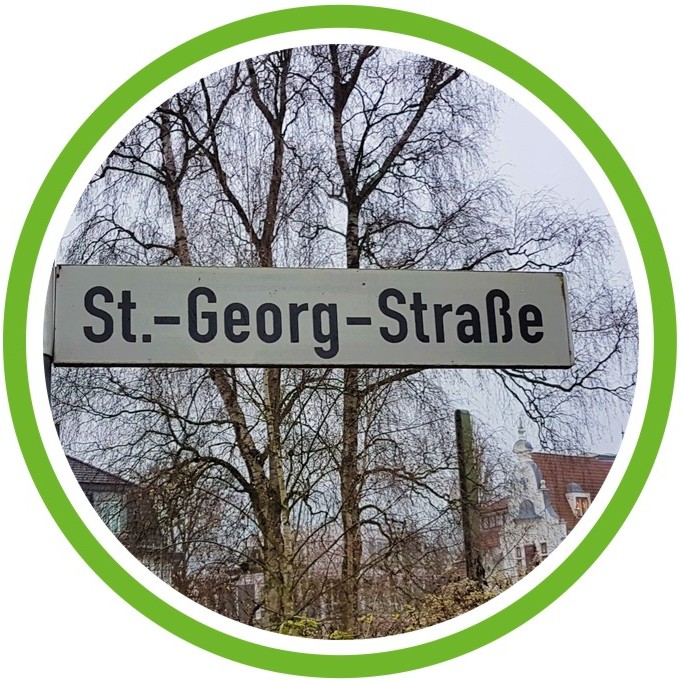Not in the mood for reading?
You can listen comfortably to all the information here and while exploring the region.
St. George Street –
Birthplace of the colonial critic and pacifist Hans Paasche
Who was Hans Paasche?
Hans Paasche was born on April 3rd, 1881 on 101 St. Georg Steet in Rostock. His father Hermann Paasche was an economist, university professor and later the Vice-President at the Reichstag (the then so called parliament) . Even as a young man, Hans Paasche rebelled against his conservative, middle-class family. The pries Willi Passig from Rostock wrote about the young boy Hans Paasche:
When the major generals of the army were sitting at the table, they usually removed their monocles carefully. Something extraordinary had to happen, if they suddenly dropped them. It was indeed extraordinary, when a young lieutenant named Hans Paasche jumped over the table in order to change his place.
translated from German original: Passig 2017, 178-179
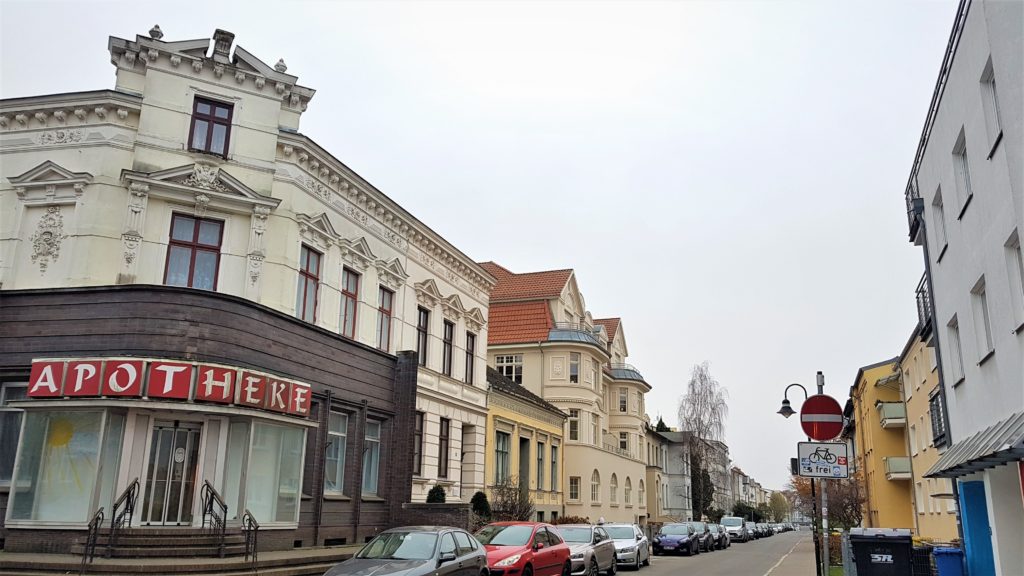
Further in time, however, Paasche initially became a naval and colonial officer. As a navigational officer, Paasche experienced the Maji-Maji rebellion in 1905. It was one of the largest colonial wars triggered by the Germans, in the former colony of “German East Africa” (today’s Tanzania, Burundi and Rwanda). The troops of the German empire brutally and ruthlessly knocked down the rebels. Because of this decisive experience Paasche became a convinced critic of colonialism. More and more he shared his doubts about the colonial war straightforward with his soldiers, made himself unpopular under the army command and attracted more suspicion from the government.
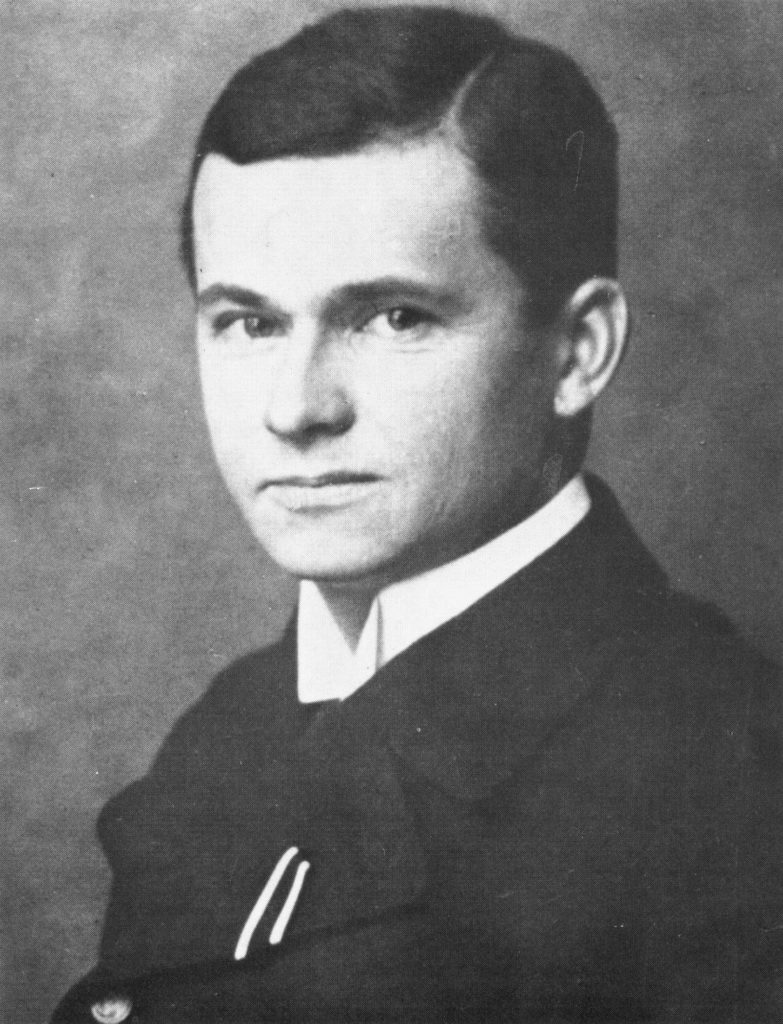
During his time in Africa, Paasche learned Kiswahili in order to be able to communicate. First he stayed on the coast of what is now Tanzania, from there he went further inland, where he independently endeavored to achieve a quick peace agreement with the locals (Lange / online chronology). He treated the local people with respect and was therefore also accepted with respect and trust. These encounters changed Paasche’s life. In 1909 he was released from military service and declared himself a pacifist.
Back in Germany Paasche worked as an anti-militarist publicist and in 1912 he published “Letters from the African man Lukanga Mukara” (original: “Die Briefe des Afrikaners Lukanga Mukara”) in a magazine. In these publications the fictional African man Lukanga from Kitara sents letters from Germany to his king in Africa to describe him, how he explores life and culture in Germany. Lukanga describes the supposedly civilized German ways of life from his own perspective and expresses himself extremely astonished and averse to the Germans and their so called “culture”.
With these texts Paasche was able to show that the Germans had no right to see themselves as a higher civilization in comparison to the African society. In addition he managed to point it out in a satirical way.
With this and other anti-militarist propaganda work, Paasche made himself very unpopular in the government. In 1917 he was arrested and charged with high treason. After his liberation through the sailors’ revolt in 1918, he retired to his estate “Waldfrieden”, located east of the Elbe. There he continued working against German militarism.
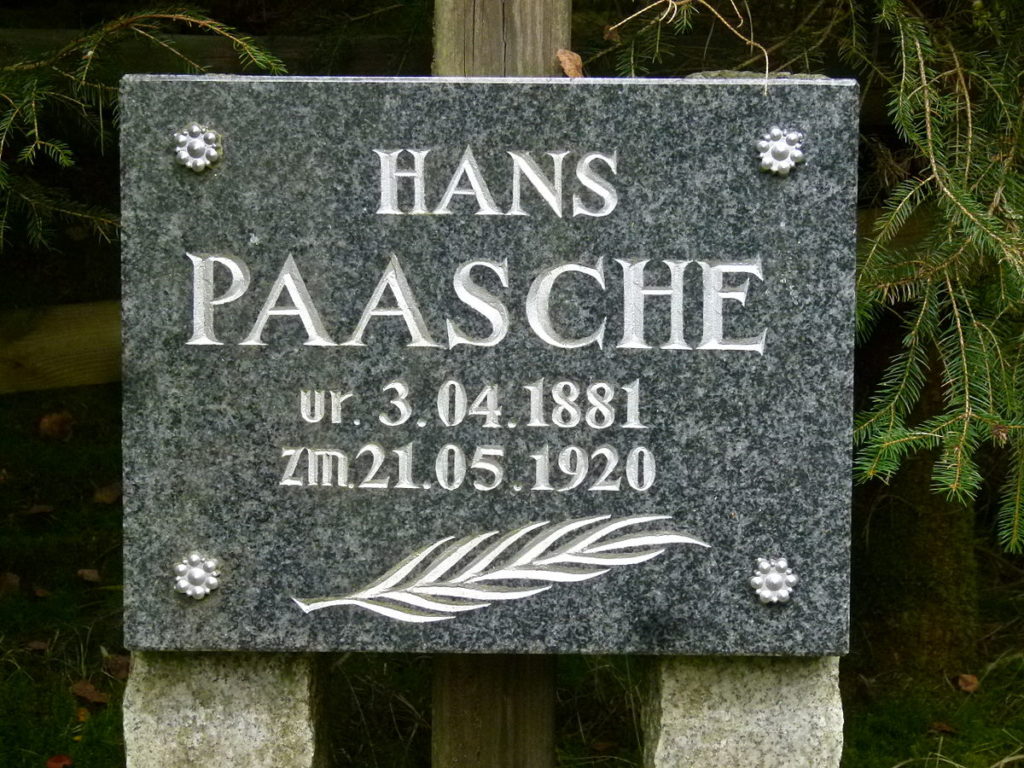
On May 21 1920, Hans Paasche was shot by Reichswehr soldiers in “Waldfrieden”, because he turned his back to the soldiers, which he didn’t expect on his estate. The shooters explained they had to fire, because Paasche wanted to escape. Paasche was accused of hiding weapons for a communist revolt on his estate. They never found a single weapon. (Donat / Zeit article).
Paasche: Colonial critic, environmentalist and pacifist.
Although Hans Paasche criticized colonialism more and more, after the Maji-Maji rebellion he himself spent another 4 years in Africa (in what is now Tanzania) and remained in the military. He made use of the class in which he was born and found, if even only a few, supporters in the military and government ranks. Paasche was an individual because he was always ready “[…] to work on himself, […] to change his own morals, to question his lifestyle and to submit to ongoing self-assessment.” (translated from German original: Passig 2017, 179)
Hans Paasche not only recognized the great damage caused by colonialism, he also tried “to dissuade his subordinates and comrades from alcohol” (Fetscher 2016, 91-92). In addition, he campaigned for women’s suffrage, animal rights and vegetarianism. For Paasche the exploitation of nature for economic growth was a narrow-minded concept.
It should be mentioned, that with the outbreak of World War I, Paasche was reactivated in the military because he believed that it was a war against Germany. In fact he was blinded by political propaganda. When he realized that he was fighting on the side of the attackers, his rejection of any form of warfare strengthened once more, so that he was discharged from military service in 1916 and barely escaped the death penalty (Passig 2017, 182; Donat / Zeit article ).
The letters of the African man Lukanga Mukara.
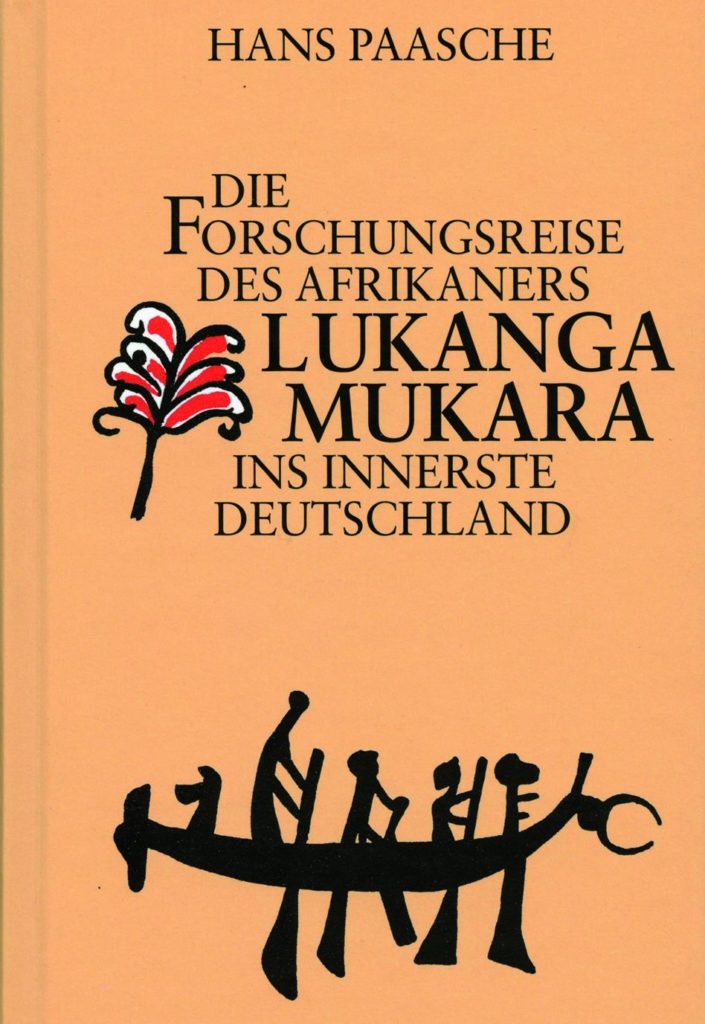
Paasche tried to reach the Germans in 1912 by publishing the fictional letters of Lukanga Mukara. He wrote a satirical exposure of thef Prussian and European civilization, using a simple language and at the same time held up a mirror to the Germans. (Donat 2020, 17).
In one of his letters Lukanga Mukara wrote from Germany to his king in Kitara:
“There is a lot of smoke in Germany. But this is not smoke that speeds up the steps or makes the heart (of the hiker) beat faster. It’s smoke in the fresh air. […] He is led to heaven in long stone tubes. But the heaven doesn’t want it, so it lies like an early morning mist over the earth. […] the air that the Wasungu (the Germans) get used to breathing is unbearable. They love to be together in closed rooms for work, for pleasure, for class […]. For hours. Everyone breathes the air that someone else has already breathed. Many of them must be sick. I do not know it; because I only see healthy people in the streets and believe that they will move the sick to another place. ” (translated from German original: Paasche, in: Hähnel (Hg.) 2016)
This is just one of the many descriptions that Paasche wrote in the name of the fictional Lukanga Mukara. With this change of perspective Paasche manages to significantly shake the prevailing eurocentric ideas. Ideas, which form an ideological judgment about other societies, while glorifying the own ideals.
What conclusions can we draw from this today?
Eurocentric ideas and at the same time racism still exist in many ways. Even if Paasche’s letters are over 100 years old, they reflect highly topical issues. A hundred years ago, Paasche managed to become aware of the privileges that come with being white. He wrote down the thoughts of people he met in Africa and like this gave them a voice with his publications.
The way we deal with racism in our society today still needs a lot of work and education.
Many people suffer from everyday racism and institutional racism. Racism happens consciously ans unconsciously. Just as Paasche managed to reflect himself, we also can get to know other perspectives today and ask ourselves how racism works and which strategies have established around it.
Tupoka Ogette is an expert on diversity and anti-discrimination and in this context her book: “Exit Racism” is a must to read. It describes the emotional phases people go through when they embark on the path to see racism through different eyes. She invites us to deal with emotions that arise when it comes to the topic of racism.
Reference List
- Pastor em. Dr. phil. Willi, Passig Rostocker Porträts – Persönlichkeiten aus 800 Jahren Stadtgeschichte, Elmenhorst/Vorpommern: Edition Pommern 2017,178-184
- Iring Fetscher, Hans Paasche (1881-1920) – Kapitänleutnant a.D., Pazifist und Radikaldemokrat, in: Franziskus Hähnel (Hg.), Hans Paasche: Die Forschungsreise des Afrikaners Lukanga Mukara ins innerste Deutschland”, Bremen: Donat Verlag 2016, 91-114
- Helmut Donat: „Rebell in Uniform“, in: Die Zeit Nr. 22, 20.05.2020, 17
- Helga Paasche und Helmut Donat (Hg.), Hans Paasche: Ändert euren Sinn!, Bremen: Donat Verlag, 1992
- Werner Lange (Hg.), Hans Paasches Forschungsreise ins innerste Deutschland – Eine Biographie, Bremen: Donat 1994
- Werner Lange: “Chronologie des Lebens von Hans Paasche”, unter: https://hanspaaschede.wordpress.com/chronologie-verfasst-durch-werner-lange/ (abgerufen am 13.08.2020)
Book Recommendation
- Tupoka Ogette: Exit RACISM. Rassismuskritisch denken lernen, Unrast-Verlag 2017
- Franziskus Hähnel (Hg.), Hans Paasche: Die Forschungsreise des Afrikaners Lukanga Mukara ins innerste Deutschland”, Donat Verlag 2016


